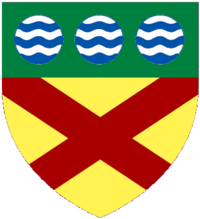Ted Willis, Baron Willis
Edward Henry Willis, Baron Willis (13 January 1914 - 22 December 1992) was a British playwright, novelist and screenwriter who was also politically active in support of the Labour Party.[1][2]
Early life and War service
Born in Tottenham, Middlesex, Willis was elected Chairman of the Labour League of Youth as the candidate of the left in 1937. In 1941 he became Secretary General of the Young Communist League. He was also drama critic for the Daily Worker[3]
Willis enlisted in the Royal Fusiliers in 1939, subsequently serving in the Army Kinematograph Service.[4][5] He often spoke at meetings during the Second World War in favour of opening a second front in order to help the Red Army which was bearing the brunt of the Nazi onslaught.
Writing career
His passion for drama first manifested in plays he wrote for the Unity Theatre, based in a former chapel near St Pancras, during the war. He was best known for writing the television series Dixon of Dock Green, based on the stories of Gordon Snashall, a local Chislehurst policeman with whom he was great friends; the series ran for more than twenty years. He also wrote nine films. He was Chairman of the Writers' Guild of Great Britain from 1958 to 1964. Willis created several British television series such as Virgin of the Secret Service, Hunter's Walk, The Adventures of Black Beauty, Copper's End, Sergeant Cork and Mrs Thursday.
He was listed in the Guinness Book of Records as the world's most prolific writer for television, and also wrote 34 stage plays and 39 feature films.[4]
Honours and awards
Announced on 23 December 1963 he was awarded a life peerage,[6] which was created on 21 January 1964 with the title Baron Willis, of Chislehurst in the County of Kent,[7] on a Labour Party nomination.[8]
Willis was the subject of This Is Your Life in 1959 when he was surprised by Eamonn Andrews in the club at the BBC's Lime Grove Studios, in London's Shepherd's Bush.
  |
|
Personal life
He married the actress Audrey Hale in 1944 and they had a son and a daughter.[5] He died of a heart attack at his home in Chislehurst, Kent in December 1992 aged 78,[4] and was buried at Tottenham Cemetery.[10]
Credits
Selected plays
- Buster (1943)
- Hot Summer Night (1958)
- The Scent of Fear (1959)
Films
- The Undefeated 1949
- A Boy, a Girl and a Bike (1949)
- The Huggetts Abroad (1949)
- The Blue Lamp (original treatment, 1950)
- The Wallet (US Blueprint for Danger, 1952)
- Top of the Form (1953)
- Trouble in Store (1953)
- The Large Rope (US: The Long Rope, 1953)
- Burnt Evidence (1954)
- Up to His Neck (1954)
- One Good Turn (1955)
- Woman in a Dressing Gown (1957)
- The Young and the Guilty (1958)
- No Trees in the Street (1959)
- Flame in the Streets (1961)
- Bitter Harvest (1963)
Selected TV
- The Pattern of Marriage (1953)
- Dixon of Dock Green (1955-1976)
- Tell It to the Marines (1959-1960)
- Taxi! (1963-1964)
- Sergeant Cork (1963-1969)
- Mrs Thursday (1966-1967)
- The Adventures of Black Beauty (1972-1974)
References
- ^ Pattullo, Polly (23 December 1992). "Obituary:Ted Willis". The Guardian. Manchester.
- ^ Sutton, Shaun (23 December 1992). "Obituary: Ted Willis". The Guardian. Manchester.
- ^ https://www.independent.co.uk/news/people/obituary-lord-willis-1565335.html
- ^ a b c Roberts, Alison (23 December 1992). "Creator of Dixon dies aged 78". The Times. London.
- ^ a b "Lord Willis: Obituary". The Times. London. 23 December 1992.
- ^ "No. 43190". The London Gazette (Supplement). 23 December 1963. p. 10533.
- ^ "No. 43225". The London Gazette. 21 January 1964. p. 571.
- ^ "WILLIS, Ted". British Film Institute. Retrieved 20 August 2013.
- ^ http://www.cracroftspeerage.co.uk/online/content/lp1958%20w.htm
- ^ "Ted Willis, Baron Willis". Find a Grave. Retrieved 7 May 2015.
External links
Bibliography
- Willis, Ted (1970). Whatever Happened to Tom Mix? The Story of One of My Lives. London: Cassell. ISBN 0304936758.
- Willis, Ted (1991). Evening All: Fifty Years Over a Hot Typewriter. London: Macmillan. ISBN 0333546865.
